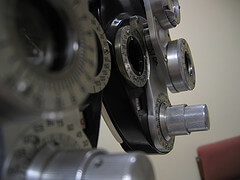Retinal Detachment Symptoms and Treatment
 Although many people express themselves by rolling their eyes, ultimately, eyes are supposed to stay properly attached and in place, but those who suffer from retinal detachment experience some trouble with this. The retina is an important layer of tissue that is on the back of the eye and is supplied with the oxygen it needs for proper function through the attached blood vessel. When that connection is compromised, the eye loses oxygen, and if the condition is not quickly treated, vision is lost as well. The longer the wait, the worse it gets. Receiving an early diagnosis and treatment can save vision.
Although many people express themselves by rolling their eyes, ultimately, eyes are supposed to stay properly attached and in place, but those who suffer from retinal detachment experience some trouble with this. The retina is an important layer of tissue that is on the back of the eye and is supplied with the oxygen it needs for proper function through the attached blood vessel. When that connection is compromised, the eye loses oxygen, and if the condition is not quickly treated, vision is lost as well. The longer the wait, the worse it gets. Receiving an early diagnosis and treatment can save vision.
Symptoms of Retinal Detachment
One of the main things that indicate the possibility of retinal detachment is when a person sees “floaters” in their line of sight. These look like specks of debris, hair or spots that seem to be floating in air. If the detachment is happening in a specific eye, that eye may notice flashes of light. It can also seem that a curtain has begun to close on the visual field of an affected eye. There may also be some shrinking of vitreous, the gel-like material that fills the eye. Seeing spots of floaters for a few seconds does not necessarily warrant a diagnosis of a detached retina. If floater persist, treatment is likely needed.
How and Why Does Retina Detachment Happen?
The retina connection becomes more fragile as people get older, especially for those over 40. Those most at risk are very nearsighted people, due to stretching of the eyeball. Those who have experienced an inflammatory eye disorder, advanced diabetes, or have sustained an injury to the eye may experience retina thinning, which leads to tears and fluid leakage. Family history can also play a role.
Getting Treatment for Retinal Detachment
In most cases, retinal detachment can be repaired, but the extent to which vision is restored depends largely on how quickly a person gets treatment. Whenever possible, a person who experiences symptoms should see an eye specialist immediately. For many, this means going to an emergency department that has an ophthamologist available. At the very least, they should be able to provide an appropriate referral.
In some cases, retinal detachment is minor enough that it will heal on its own, in other cases, surgery, laser therapy, or other treatments will be required as well as professional observation to assure that healing is properly progressing. In some cases, it will take months to recover from retinal detachment, and the recovery period often requires that activities be restricted in order to prevent recurrence.
Sometimes, when retinal detachment happens it is something that should have been preventable. It may have been triggered by a physical injury that happened during a car accident, falls, or exposure to chemicals. At times, symptoms are reported to a person’s regular doctor or an emergency room doctor, and those reports are not taken seriously, allowing the condition to worsen. The ophthalmologist may also fail to diagnose or mismanage the condition.
Ophthalmologists have a low rate of malpractice claims brought against them compared with health care professionals in other disciplines, however, when claims are made, failure to diagnose retinal detachment is the second most common reason, after glaucoma related issues. Mismanaging the disease is also a possible reason for a claim, although it happens much less often.
At times, retinal detachment is not immediately detected through the initial eye exam, but in nearly two percent of cases, a retinal tear will be present within six weeks. Ophthalmologists should be diligent in educating their staff as to what constitutes an urgent case and what isn’t. keeping patients as well informed about their own condition as possible, and charting these interactions on the patient’s chart.
Proper vision is key to a person’s ability to maintain their sense of control of their world, and independence. A drastic deterioration can greatly reduce the quality of a person’s life and may even contribute to conditions such as depression and anxiety disorders.
When You May Need a Louisville Malpractice Lawyer
If you experienced retinal detachment, and are facing additional obstacles in your life because of it, it is important to consider why. If it happened because of a physical injury, or if became worse due to your being denied timely diagnosis or case, the Louisville medical malpractice attorneys at Meinhart and Manning, PLLC may be able to help.
As important as it is to receive timely treatment for retinal detachment, as well as other injuries, it is just as important to act right away on any pertinent personal injury or malpractice case. The state of Kentucky imposes a statute of limitations on the length of time a person can file a case. Pursuing action right away, also keeps details more fresh and evidence more reliable.
Contact us to set up a consultation to discuss your situation and we’ll help you decide which course of action is best for you.